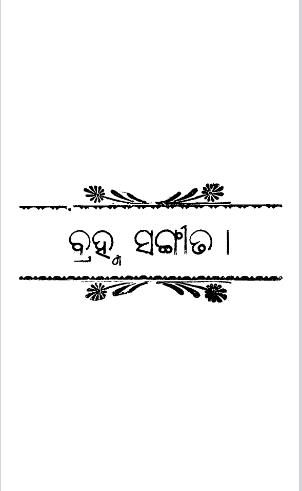In the rich tapestry of Odia literature, few works stand out as timeless treasures that capture the essence of spirituality and existential inquiry. One such masterpiece is Brahma Sangita, penned by the illustrious poet Biswanatha Kar and published in 1926. This remarkable collection of poetry resonates with deep philosophical insights and a profound exploration of the nature of existence, divinity, and the interconnectedness of all life.
Brahma Sangita serves as a meditative expedition into the realm of consciousness, bridging the gap between the material and the spiritual. Kar’s poetry emerges as a beacon of light, guiding readers through the complexities of life, urging them to seek higher truths beyond the mundane. The title itself—Brahma signifying the ultimate reality, and “Sangita” referring to song or melody—beautifully encapsulates the harmonious relationship between the divine and the human experience.
Kar’s verses are imbued with rich imagery and metaphors, reflecting the beauty of nature and the grandeur of the universe. He skillfully weaves together elements of Odia culture, philosophy, and spirituality, presenting a holistic view of life. In Brahma Sangita, one can find echoes of classical Eastern philosophies, notably the teachings of Vedanta and the nuances of Bhakti, which emphasize devotion and the intimate relationship between the devotee and the divine.
The poetry not only encapsulates spiritual ideas but also delves into the joys and sorrows of human existence. Kar’s ability to evoke deep emotions through his words makes the poems relatable, transcending time and inviting readers to reflect on their own lives. He challenges the reader to contemplate fundamental questions: Who are we? What is our purpose? How do we connect with the divine? These questions are wrapped in lyrical elegance, making each poem a profound meditation in itself.
Kar’s innovative use of poetic forms and rhythmic structures adds a unique flavor to “Brahma Sangita.” He employs a blend of traditional Odia styles with modern lyrical influences, creating a seamless fusion that resonates with diverse audiences. The musicality of his language enhances the reading experience, transforming each poem into a melodic expression of thought and feeling.
Published in 1926, Brahma Sangita not only revolutionized Odia poetry but also paved the way for future generations of poets to explore spiritual themes in their works. Kar’s influence extends beyond his lifetime, inspiring countless writers and thinkers who continue to draw from his insights into human existence and the search for truth.
In contemporary discourse, Brahma Sangita remains relevant as it addresses universal themes that resonate with the modern reader. In a world increasingly filled with chaos and uncertainty, the tranquility and wisdom found within these poems offer solace and guidance.
Books Info
| Books name | Brahma Sangita / ବ୍ରହ୍ମ ସଂଗୀତ |
| Author | Biswanatha Kar |
| No Of pages | 84 |
| Publisher | Sri Biswanath Kara |
| Publication | 1926 |
| Printed At | The Utkal Sahitya Press |
| Distributor | NA |

